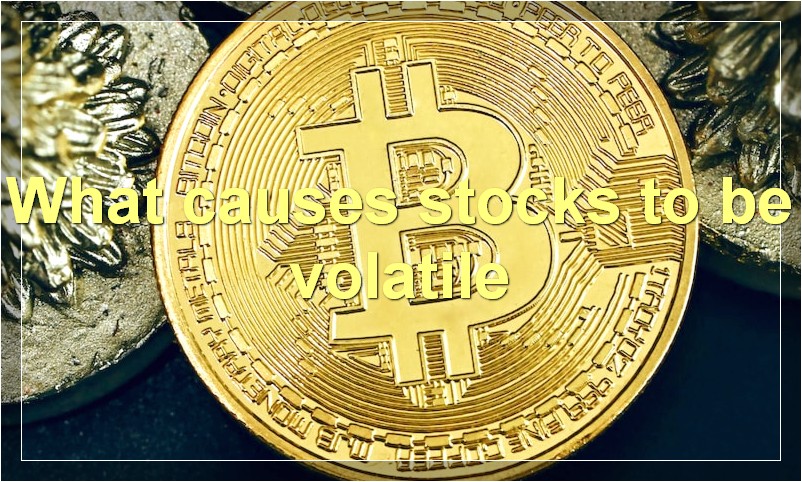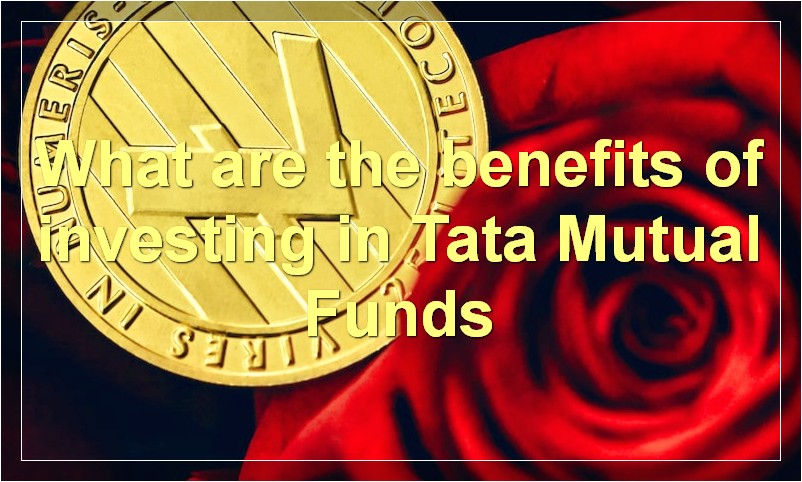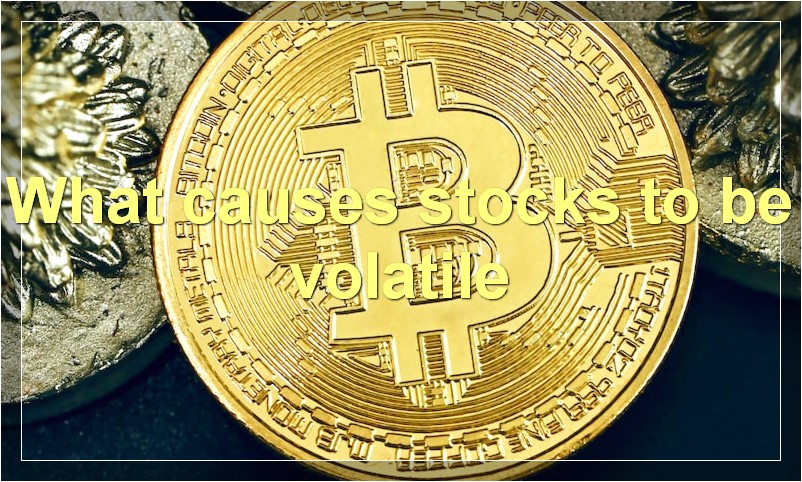If you’re looking for high-risk, high-reward stocks, then you need to know about volatile stocks. Here’s what you need to know about investing in these types of stocks, and how to make the most of your investment.
What are the top volatile stocks
Volatile stocks are those that see big swings in price, often due to news or events. They can be risky, but they can also offer big rewards.
Some volatile stocks to watch in 2020 include:
Tesla (TSLA)
Zoom Video Communications (ZM)
Crocs (CROX)
Beyond Meat (BYND)
Tesla is one of the most volatile stocks on the market. The electric car maker has seen its share price swing from $180 to $540 in just the last year. The company is constantly in the news, and its stock price reflects that. Zoom Video Communications is another volatile stock that has been on a tear lately. The company’s stock is up over 500% in the last year as the world has turned to online communication during the pandemic. Crocs is a more surprising entry on this list. The footwear company’s stock is up nearly 400% in the last year as people have turned to comfortable shoes that can be worn at home. Beyond Meat rounds out the list with a stock that is up over 250% in the last year. The plant-based meat company has seen its products gain in popularity as people look for healthier options.
These are just a few of the most volatile stocks on the market. While they can be risky, they can also offer big rewards. So, if you’re looking for a little excitement in your portfolio, these stocks are worth a look.
What causes stocks to be volatile

When it comes to stocks, volatility is the name of the game. Prices can rise and fall rapidly in response to news and events, and investors never really know what’s going to happen next. So what causes stocks to be so volatile?
There are a number of factors that contribute to stock market volatility. First, there’s the issue of supply and demand. When there are more buyers than sellers, prices go up. But when there are more sellers than buyers, prices go down. This simple economic principle can have a big impact on stock prices.
Another factor that contributes to stock market volatility is the fact that stocks are often traded on emotion. When investors are feeling bullish, they’re more likely to buy stocks. But when they’re feeling bearish, they’re more likely to sell. This can lead to sharp swings in stock prices as investor sentiment changes.
Lastly, there’s the issue of leverage. When investors use leverage (borrowing money to buy stocks), they’re increasing their potential gains but also their potential losses. This can amplify the effects of both positive and negative news, leading to even more volatility in stock prices.
How do you identify volatile stocks
Volatile stocks are ones that move up and down rapidly, often in response to news. They can be more risky than stocks that are more stable, but they can also offer more opportunity for growth. There are a few ways to identify volatile stocks:
One way is to look at the stock’s beta. Beta measures how much a stock moves in relation to the market. A stock with a beta of 2 will move twice as much as the market, while a stock with a beta of 0.5 will move half as much. So, a stock with a high beta is more likely to be volatile.
Another way to identify volatile stocks is to look at their historical volatility. This is a measure of how much the stock has moved, on average, over a certain period of time. A stock that has been very volatile in the past is likely to be volatile in the future.
Finally, you can look at analyst recommendations. If analysts are expecting a stock to be volatile, they will often give it a “buy” rating. So, if you see a lot of “buy” ratings for a particular stock, it may be worth taking a closer look.
Is it good to invest in volatile stocks
Volatile stocks are those that fluctuate rapidly in price. They can offer opportunities for quick profits, but they also come with greater risks. Before investing in volatile stocks, be sure to do your research and understand the risks involved.
What are the risks of investing in volatile stocks
There are a few risks to take into consideration when thinking about investing in volatile stocks. The first is that the stock could lose value quickly, which would result in a loss for the investor. Another risk is that the company behind the stock may not be as stable as investors would like, meaning that there is a chance that the company could go bankrupt and the stock would become worthless. Finally, volatile stocks tend to be more expensive than other types of stocks, so there is a greater chance that investors will not see a return on their investment if the stock does not perform well.
What are the benefits of investing in volatile stocks

Volatile stocks are often seen as a high-risk investment, but there can be significant rewards for investors who are willing to take on the risk. Volatile stocks tend to be more volatile than the overall market, which means they can offer higher potential returns but also come with higher risks. While there is no guarantee that investing in volatile stocks will lead to success, there are a number of potential benefits that make it an attractive option for investors who are willing to take on the risk.
One of the main benefits of investing in volatile stocks is the potential for high returns. While there is no guarantee that every volatile stock will be a success, the potential for large gains is often much higher than with more stable investments. For example, a stock that doubles in value is much more likely to see its price drop by 50% at some point than a stock that only goes up by 10%. However, the possibility of such large gains can make volatile stocks an attractive option for investors who are looking to maximize their returns.
Another benefit of investing in volatile stocks is that they can provide diversification benefits. While most investors understand the importance of diversification, it can be difficult to achieve with a portfolio of only stable investments. Volatile stocks can help to provide diversification by offering exposure to different types of risk. For example, a portfolio consisting entirely of blue-chip stocks may be considered diversified, but it would not offer much protection if the overall market was to experience a sharp decline. However, adding a few volatile stocks to the mix can help to offset some of the risks associated with a more traditional portfolio.
Of course, there are also risks associated with investing in volatile stocks. As mentioned earlier, these stocks tend to be more volatile than the overall market, which means they can experience sharp declines in value. This can lead to substantial losses for investors who are not prepared for such price movements. In addition, volatile stocks can be more difficult to sell when prices are falling, as there may be few buyers willing to take on the risk. As such, it is important to carefully consider whether investing in volatile stocks is right for you before taking the plunge.
Despite the risks, there are a number of potential benefits that make investing in volatile stocks an attractive option for many investors. These stocks can offer the potential for high returns and help to provide diversification benefits. If you are willing to take on the risk, then investing in volatile stocks may be a good way to boost your portfolio’s performance.
Should I avoid volatile stocks
There are many different schools of thought when it comes to investing in stocks. Some people believe that volatile stocks are a good investment because they have the potential to generate a lot of return. Others believe that volatile stocks are too risky and should be avoided.
I believe that whether or not you should avoid volatile stocks depends on your personal financial goals and risk tolerance. If you are someone who is looking to make a quick profit, then volatile stocks may be a good option for you. However, if you are someone who is looking to invest for the long term and wants to minimize risk, then avoiding volatile stocks may be the best choice.
Ultimately, the decision of whether or not to invest in volatile stocks comes down to your personal circumstances. If you are comfortable with taking on more risk, then investing in volatile stocks may be a good option for you. However, if you are risk-averse, then avoiding these types of stocks may be the best decision.
What happens to volatile stocks during a recession
When the stock market crashes, investors tend to flock to stable, blue chip stocks. This is because they are seen as a safe investment during times of economic turmoil. However, what happens to volatile stocks during a recession?
Volatile stocks are those that see big swings in their prices. They can be high-risk, high-reward investments, but during a recession, they can be very risky. Many investors will sell off their volatile stocks during a recession in order to minimize losses.
However, there are also some investors who believe that buying volatile stocks during a recession can be a smart move. These investors believe that the prices of these stocks will eventually rebound and they will be able to make a profit.
only time will tell which strategy is the best for investing in volatile stocks during a recession.
Do all stocks become more volatile during a market crash
The answer to this question is a bit more complicated than simply yes or no. While it’s true that all stocks become more volatile during a market crash, there are a number of factors that contribute to this increased volatility. For example, the size of the company and the sector in which it operates can play a role in how much its stock price fluctuates during a market crash. Additionally, the overall market conditions at the time of the crash can also impact individual stock prices.

